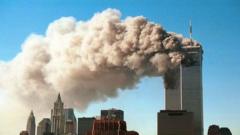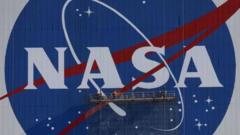What Were the September 11 Attacks and How Many Lives Were Lost?

Published: 2025-09-11 07:07:06 | Category: wales
The 11 September attacks, also known as 9/11, were a series of coordinated terrorist attacks carried out by the extremist group al-Qaeda. On that fateful day in 2001, four commercial airliners were hijacked and used as weapons against iconic American landmarks, resulting in nearly 3,000 casualties and profound changes to global security policies. The anniversary serves as a reminder of the tragic loss of life and the ongoing impacts of terrorism.
Last updated: 11 September 2023 (BST)
Key Takeaways from the 9/11 Attacks
- Four planes were hijacked, with two striking the Twin Towers in New York, one hitting the Pentagon, and the last crashing in Pennsylvania.
- Nearly 3,000 people lost their lives, with significant casualties among first responders and international citizens.
- The attacks were orchestrated by al-Qaeda, led by Osama Bin Laden, in response to perceived US aggression in the Muslim world.
- The US launched a military campaign in Afghanistan shortly after the attacks to dismantle al-Qaeda.
- Global security measures were significantly tightened, leading to the establishment of the TSA in the US.
- The memorial and museum at Ground Zero serves as a tribute to the victims and the resilience of New York City and the nation.
The Events of 11 September 2001
On the morning of 11 September 2001, chaos erupted in the United States as terrorists hijacked four commercial flights. Flight 11 and Flight 175 were directed towards the Twin Towers of the World Trade Center in New York City, while Flight 77 was aimed at the Pentagon, the headquarters of the US military. The fourth plane, United Airlines Flight 93, crashed into a field in Pennsylvania after passengers attempted to retake control from the hijackers. The attacks resulted in the deaths of 2,977 people, marking a dark chapter in US history.
The Impact on New York City
The Twin Towers were not just iconic structures; they were symbols of American prosperity and resilience. When the first plane struck the North Tower at 8:46 AM, an estimated 17,400 people were inside the buildings. The swift and devastating attacks led to the deaths of 2,753 individuals in New York alone, which included 441 first responders who heroically rushed to the scene.
The quick succession of the strikes—just 17 minutes apart—resulted in a catastrophic fire that ultimately caused both towers to collapse within two hours. The aftermath left a cloud of dust and debris that enveloped the city, forever changing its skyline and the lives of its residents.
The Global Consequences of the Attacks
The 9/11 attacks had far-reaching implications that extended beyond the immediate devastation. In the wake of the tragedy, the United States and its allies launched the War on Terror, beginning with the invasion of Afghanistan less than a month later. The primary goal was to dismantle al-Qaeda and eliminate its leader, Osama Bin Laden. This military response marked a significant shift in US foreign policy, leading to nearly two decades of conflict in the region.
The Role of Al-Qaeda
Al-Qaeda, an extremist group founded by Osama Bin Laden, was responsible for planning the attacks. The group operated from Afghanistan, where it had established a network that facilitated the recruitment and training of its operatives. The mastermind behind the plot, Khalid Sheikh Mohammed, played a crucial role in orchestrating the hijackings and recruiting the 19 hijackers, most of whom were from Saudi Arabia.
The motivations for the attacks were rooted in a complex interplay of geopolitical tensions, including US military presence in the Middle East and support for Israel. Al-Qaeda viewed the US as a principal adversary, blaming it for various conflicts in the Muslim world.
Security Changes Post-9/11
In the aftermath of 9/11, security protocols were overhauled globally. In the United States, the Transportation Security Administration (TSA) was established to enhance airport security and prevent future attacks. This included stricter screening processes for passengers and baggage, as well as the introduction of advanced security technology.
Moreover, policies on international travel were tightened, and intelligence-sharing among agencies improved significantly. The legacy of 9/11 continues to influence security measures in various sectors, from aviation to public gatherings.
The Reconstruction of Ground Zero
Following the destruction, the area known as Ground Zero underwent significant transformation. The cleanup and recovery efforts at the site took more than eight months. Eventually, a memorial and museum were established to honour the victims and educate future generations about the events of that day. The One World Trade Center, also known as the Freedom Tower, was constructed as the centrepiece of the new World Trade Centre complex, standing at 1,776 feet (541 meters) to symbolise hope and resilience.
The Ongoing Legal Proceedings
As of now, the legal proceedings against Khalid Sheikh Mohammed and other defendants have faced numerous delays and complications. Following his capture in 2003, he has been held at Guantanamo Bay, where he has been subjected to controversial interrogation techniques. The military court has been considering his case for over a decade, with the possibility of a plea deal emerging in January 2025.
However, the recent rejection of the plea agreement has left the future of the case uncertain. The complexities surrounding his treatment and the evidence against him continue to pose challenges to a timely resolution.
The Lasting Legacy of 9/11
The legacy of the 9/11 attacks is multifaceted, impacting not only the United States but the entire world. The event changed how nations approach security and counter-terrorism, fostering international cooperation in intelligence-sharing and anti-terror initiatives. Additionally, the attacks reignited discussions about civil liberties and the balance between security and personal freedoms.
As we mark the 24th anniversary of the attacks, it is essential to reflect on the lives lost and the profound changes that have shaped global and local policies in the years since. The resilience of those affected, coupled with the ongoing challenges posed by terrorism, reminds us of the need for vigilance and understanding in a complex world.
FAQs
What were the 9/11 attacks?
The 9/11 attacks were coordinated terrorist attacks carried out by al-Qaeda on 11 September 2001, resulting in nearly 3,000 deaths and significant global security changes.
Who was responsible for the 9/11 attacks?
The attacks were orchestrated by the Islamist extremist group al-Qaeda, led by Osama Bin Laden, with Khalid Sheikh Mohammed serving as the mastermind behind the plot.
What changes were made to security after 9/11?
In response to the attacks, the US established the Transportation Security Administration (TSA) and implemented stricter airport security measures and intelligence-sharing protocols internationally.
How did the 9/11 attacks affect US foreign policy?
The attacks led to the US launching the War on Terror, which included the invasion of Afghanistan to dismantle al-Qaeda and capture Osama Bin Laden, marking a significant shift in US military engagement worldwide.
What is the current status of Khalid Sheikh Mohammed's trial?
Khalid Sheikh Mohammed has been held at Guantanamo Bay since 2003, and his trial has faced numerous delays, with a plea deal recently rejected, leaving the outcome uncertain.
As we remember the tragic events of 9/11, it is crucial to reflect on the lessons learned and the ongoing fight against terrorism. How can we cultivate a world that prioritises peace and understanding? #NeverForget #911Anniversary #GlobalSecurity



